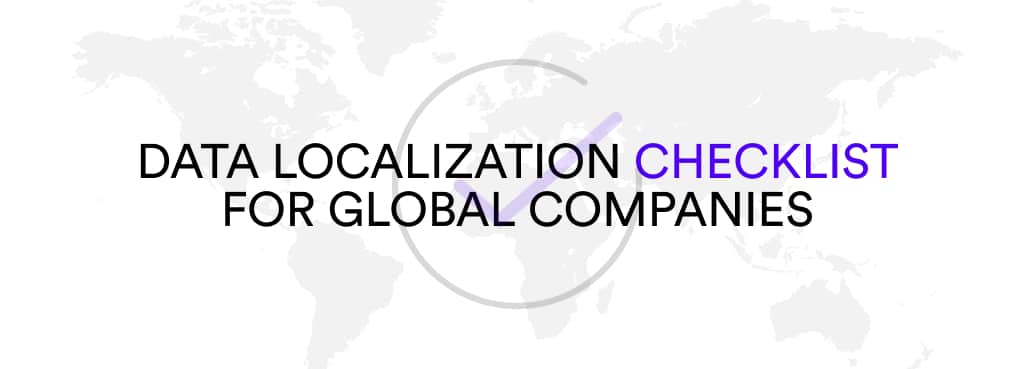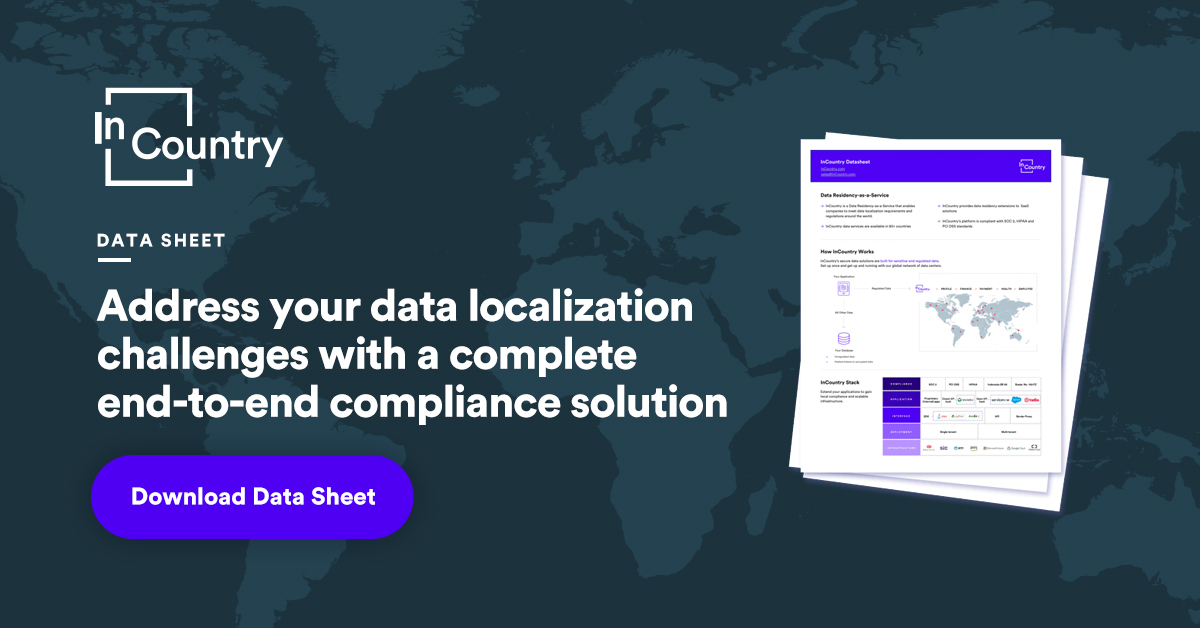What is data localization and why you need data localization checklist
We are experiencing an increase in legal local regulations as well policies around the world. These regulations restrict data movement across borders and pose certain limitations to the global digital economy, as well as to the ability of nations to maximize economic and social benefits of data-reliant technologies and businesses.
What is data localization? Data localisation in a nutshell requires companies that use, store or process data online to do so in the country of its origin. Main drivers behind this trend are the following:
- Information security
- Concerns over data privacy
- National data sovereignty
- Law enforcement
- Potential support for local businesses
Such regulations heavily depend on the country. More and more countries are implementing or introducing long-term regulations, which will control the free flow of data.
What is a data localization strategy? Data localization strategy addresses local constraints in terms of cybersecurity laws and data residency regulations that can impact their business growth.
When a business enters new (or multiple) foreign markets, it can be challenging to comply with all different local data regulations, so data localization checklist is an essential part of the data localization strategy.
Creating localization strategy beforehand ensures your business will not get into compliance legislation pitfalls and will be prepared for the global expansion in advance.
What companies need localization strategy
Even more than ever, now cross-border data flows are key predicates for countries and regions that wish to compete in the Fourth Industrial Revolution and thrive in the post-COVID-19 era.
Any company seeking international growth will sooner or later face the question of whether localizing software products is required or not. There is no simple answer to this question, as it all depends on a multitude of aspects related to your business and specific needs.
Companies dealing with complaint data need to create and maintain multiple data centers and complex infrastructures in different jurisdictions, which adds extra cost to operational spending.
Furthermore, companies relying upon such services may find they avoid certain markets altogether due to the increased cost of doing business there.
This then further affects the attractiveness of different regions when it comes to capital investment and talent retention, with data localization restrictions acting as digital walls between countries.
Yet, there are clear indicators and proof-points to determine the business value of localization and prepare a solid business localization strategy and localization checklist.
Stay updated on global data residency regulations with our always-current country maps.
Let’s look in more detail at some most common data localization requirements that exist globally.
What first comes to mind is the great Firewall of China and the GDPR law that has inspired several countries around the world to control data flow across national borders and introduce local storage requirements.
Such data regulations get adopted more and more on a global scale and range from absolute control and restriction of data flow to moderate data protection. Please see the detailed illustration below.
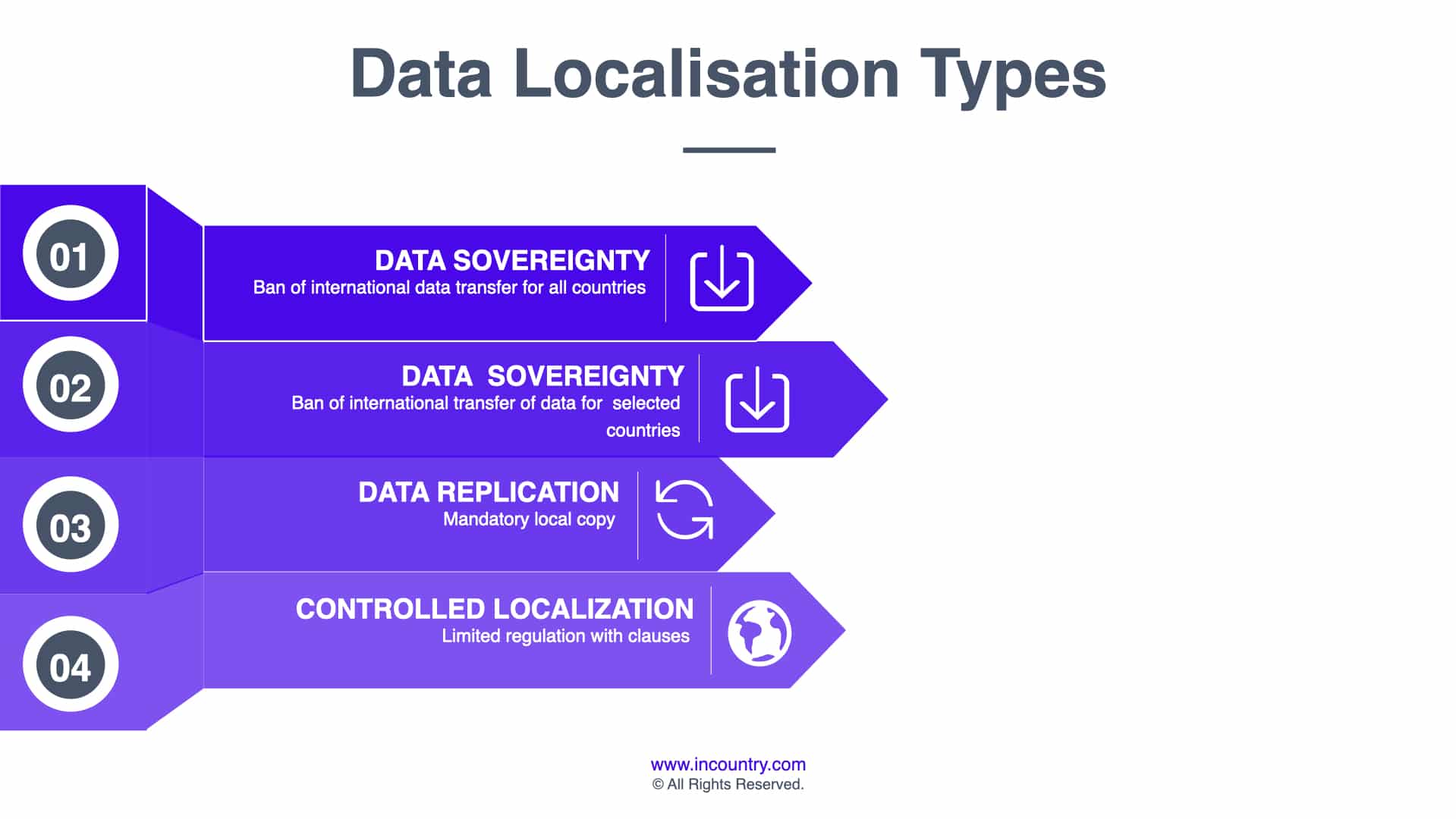
Data Sovereignty for all industries: countries require that all data related to their citizens to be stored in servers physically located inside the country.
Data Sovereignty for select industries only: only data related to certain industries cannot leave the country borders (usually such industries are Financial Services, Healthcare, Telecommunications and Government/Defense).
Example: in 2018 the Reserve Bank of India declared that all payment system providers should store payment data in the country, with similar measures planned for E-commerce, Social Media, Telecom and Healthcare. The UAE and Australia have similar measures for Healthcare data while Turkey introduced data localization for Financial services.
Data Replication: in this model copy of all compliant data needs to be stored locally and then can cross the country borders.
Example: the revised Indian Personal Data Protection Bill (like EU’s GDPR) requires tech firms to have consumers’ consent before collecting and processing their data. The data mirroring requirement of this law requires that a copy of data on Indian citizens be stored in India. Similarly, the new Cybersecurity law of 2019 in Vietnam requires online service providers to store citizens’ personal data inside the country.
Controlled localization: Less extreme laws that focus on data privacy.
Example: the most obvious case is the EU’s GDPR, which allows data transfers to other countries under certain conditions. Data can be transferred to countries that have the same level of data protection as in the EU. Similar laws have been passed in Brazil (General Data Protection Law of 2018), Colombia and Peru.
Potential Impact of data localization laws violation
As new cybersecurity and data laws get more and more power, it is important to understand the potential repercussions of avoiding them.
Operating in countries with such laws requires that companies remain compliant to local regulations and this, of course, requires additional costs.
Companies should either comply and invest in infrastructure and human capital to provide services or use third party services that will help them stay compliant (which saves time resources and cost).
For companies that don’t comply exists risk of getting fined and being legally prosecuted by local authorities.
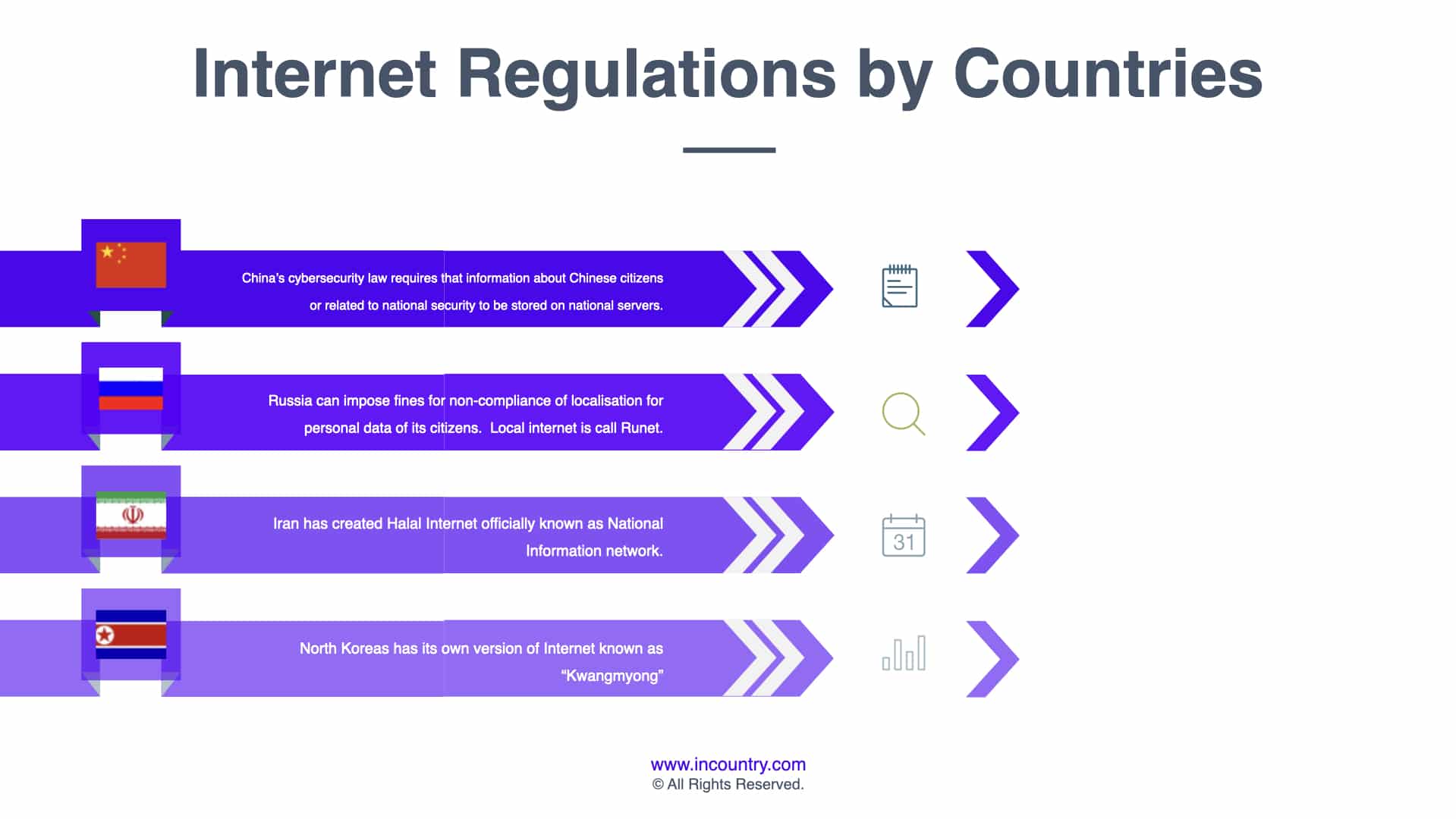
Another issue that might arise is when a copy of the data must be maintained in the country where the service is being provided. This can introduce additional costs and infrastructure risks as adding, deleting or updating records must be done across multiple locations.
If not implemented properly, this can also risk having inconsistent data sets across countries as updates/deletion of some records might happen in some and not all countries where data is stored.
How InCountry can help scale your global expansion and stay compliant with local data regulation requirements
As specific restrictions on cross-border data transfers among global economies become more strict, this results in additional costs and preparation time for companies seeking to scale globally.
Given the increased importance of the data economy, InCountry data residency-as-a-service software was created to help run SaaS applications globally, while staying compliant and safe.
We help facilitate cross-border data flows, while decreasing compliance infrastructure cost for international business players.
Partnering with InCountry is the fastest way to comply with data residency regulations and unlock new territories.
Why use InCountry
- InCountry’s global infrastructure securely manages your regulated data.
- Partnering with InCountry is the fastest way to comply with data residency regulations and unlock new territories.
- Spend less time on infrastructure and software and have more time to focus on core customer and product experiences.
- Enable your custom apps to meet data residency requirements with minimum to no development, regardless if they are in IaaS clouds or on-premises.
- InCountry enables data residency in 90+ countries in real time to enable local compliance.
- Regardless of the country regulations, apps or hosting cloud, InCountry enables companies to store or process specific data types or complete data sets for access locally, with encryption.
- Decrease data residency costs for your business
- Simple and quick integration – InCountry automates data residency.
- Developer friendly SDK and API provide flexibility and can be fully or partially integrated.
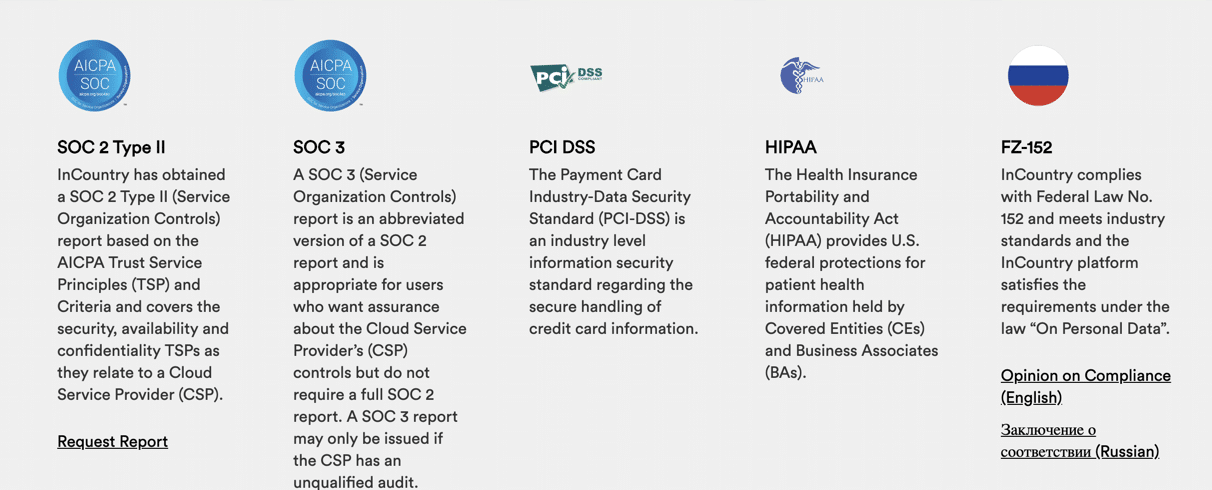
Data localization checklist
Typically, companies looking to do data localization end up going through a lengthy and exhausting list of to-do items. The process is time consuming, expensive and might make the whole process not worth the effort. At InCountry, we speak with companies all the time that tell us about their own experiences taking on data localization on their own.
Below is a checklist of what it takes to localize data and comply with regulatory requirements:
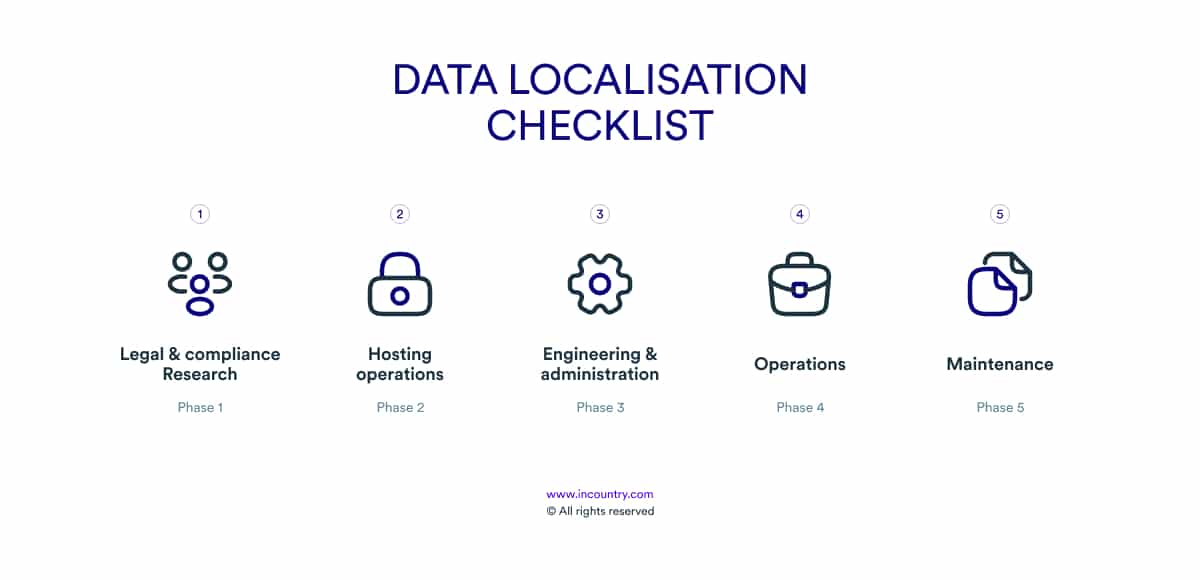
Phase 1: Research
- Research on the number of countries you need to store data in
- Research and define compliance regulations for each country (include costs of consultants and lawyers)
- Create infrastructure plan
- Create compliance regimen
Phase 2: Hosting operations
- Select hosting provider, define hosting costs
- Select backup hosting provider or local cloud, define backup hosting costs and policies
- Define implementation cost
- Contract providers
Phase 3: Engineering
- Engineering and administration
- Implement API or data layer
- Implement data backup plan
- Develop and implement information security plan
- Implement efficient WAN access
- Educate application developers on API
Phase 4: Operations
- Define and implement risk monitoring plan
- Define and implement cyber security monitoring plan
- Define cyber insurance costs
- Implement cyber insurance
Phase 5: Maintenance
- Define and implement ongoing maintenance costs
- Define and implement ongoing audit processes
Build yourself vs build with InCountry
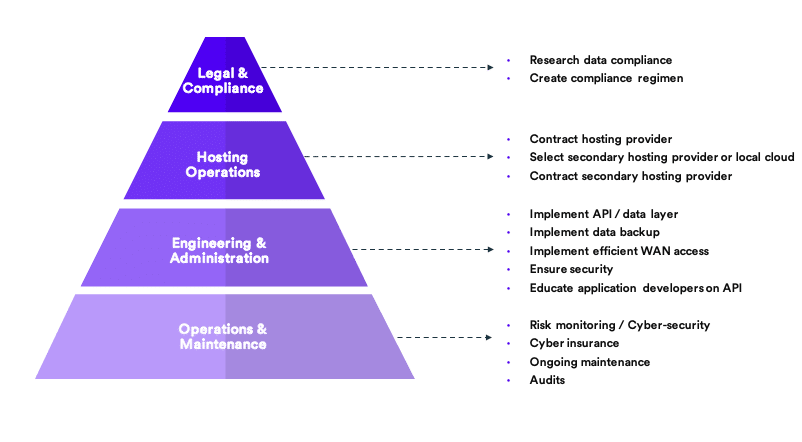
With InCountry’s end-to-end compliance solutions, customers are able to avoid this lengthy, expensive and cumbersome process. Whether it is for SaaS applications or internal ones, the data localization process is streamlined and managed by InCountry through our own SaaS interface. Customers’s data is highly secured and compliant with data regulations, while still allowing customers to keep full control of their data.


